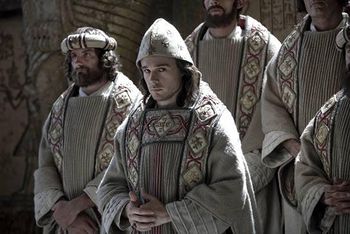Imperial Synod
Overview
The Imperial Synod is the Institution that brings together the priests of The Way from all across The Empire. The Synod was created at the founding of The Empire by the First Empress and its existence, along with some of its powers, is enshrined in the Imperial Constitution. Its role is to ensure that the Empire and its citizens remain virtuous.
Role within the Empire
The Imperial Synod's primary role is to safeguard the soul of the Empire, to keep it safe from dangers and corrupting influences without - such as foreigners, barbarians and Eternals - and within. It provides a balance on the power of the Imperial Senate and The Throne and punishes the unvirtuous by removing them from office. It also controls the supply of Pure Liao which grants access to past life visions.
Entry requirements
Any priest who ministers to a significant congregation of Imperial citizens is eligible to be a member of the Synod. This is represented by operating a church as a downtime resource. Synod members cannot normally sit in the Senate; if a priest is elected to the Senate, then they cannot vote in any part of the Synod while they serve as a senator.
History
The Synod was created at the dawn of the Empire; inspired by the Highguard Assembly of the Virtuous. The history of the Synod is intimately tied up with the history of The Way.
Powers of the Synod
The Synod is divided into a number of mutually overlapping assemblies. The General Assembly includes every member of the Synod, but membership of the other assemblies is by appointment, nationality or dedication. For instance all the members of the Synod from the nation of Dawn are part of the Dawn Assembly. The function of the assemblies is to allow judgements to be made only by the appropriate members of the Synod, so the members of the Dawn Assembly can exercise Synod powers over Dawnish citizens without needing recourse to the entire General Assembly.
Despite their names, there is no requirement for the Assemblies to meet in one place at the same time. The powers of the Synod are exercised by the judgement of an Assembly, a process explained below. Exercising the authority of an Assembly is done through individual, personal judgement.
The Virtue Assemblies
The Virtue Assemblies consist of all members of the Synod who are dedicated to the same Virtue. There are eight Virtue Assemblies, one for each Virtue and the Assembly of the Way which consists of all members of the Synod who are not dedicated to a specific Virtue. The authority of a Virtue Assembly extends to all dedicated priests and pilgrims of that Virtue, and in policing the actions and judgements of their cardinal.
The National Assemblies
The National Assemblies consist of all members of the Synod from the same nation. There are nine National Assemblies. Each National Assembly is charged with the spiritual wellbeing of the nation it is responsible for. Its authority extends only to individuals and groups within that nation.
The Assembly of Nine
The Assembly of Nine consists of the seven cardinals of the Virtue Assemblies, the cardinal of the Assembly of the Way, and The Throne. The Throne holds no authority in the Assembly save the ability to break ties on any issue that had the support of four Cardinals apiece. The authority of the Assembly of Nine extends to the whole Empire, excluding The Throne.
The General Assembly
The General Assembly consists of all members of the Synod. The authority of the General Assembly extends to the whole Empire, including the Empress.
The judgement of the Synod
To exercise their powers the Synod requires the members of an assembly to pass judgement. To raise a motion for judgement, a member of the Synod must approach the functionaries of the Synod and call for judgement on a topic. The functionaries record the matter raised and makes it visible in the Synod along with whose judgement applies to the matter (i.e. which Assembly's judgement applies). They set a deadline by which time judgements should be rendered (for example, four waking hours after the issue has been listed for judgement).
The purpose of the deadline is so that priests who are engaged on vital missions for the Empire are not excluded from being able to offer their judgement on the matter raised. It is possible for an Assembly to expedite this process by a clear majority of an Assembly coming to the Synod functionaries directly to demonstrate the support of the Assembly for the action.
Priests of the Synod are expected to check in at regular intervals to see if they have been called on to pass judgement. They register their judgement with the the Synod functionaries; a priest’s weight of judgement is determined by the size of their congregation (i.e. the status of their church). When the time limit has expired, the Synod functionaries count the judgements passed by the priests and record whether the issue has sufficient support of the Assembly to be binding.
In the case of the Virtue and National Assemblies, the outcome is decided by the judgements-for versus the judgements-against with abstentions being ignored. For the Assembly of Nine and General Assembly, the outcome is determined by the judgements of all members of the Assembly, with abstentions considered a vote against the judgement. This means that there is no need for members of the General Assembly or the Assembly of the Nine to register a judgement if they are against a motion - often this is only done to express disapproval.
A judgement made by an Assembly is considered binding on all those the Assembly has authority over, but may not contradict the Imperial Law or Senate. There is no requirement for Synod members to meet and debate as their Senate contemporaries do, though it is known for priests of the Synod to consult with one another to ensure they have the support of their Assembly before raising an issue.

